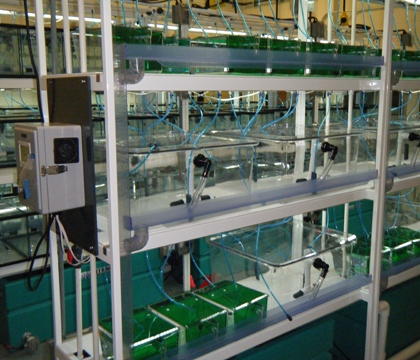
Fishing for answers
Fish are probably not the first wild creatures that come to mind when you think of Saskatchewan wildlife — but the province actually has a diverse aquatic culture in its lakes, rivers and streams.
By Melissa Cavanagh
What's troubling is that some of these aquatic species may be in danger. Environmental factors such as climate change and the introduction of new and invasive species into waters are threatening many aquatic species not only in Saskatchewan but around the world.
Dr. Maud Ferrari, an assistant professor in the Western College of Veterinary Medicine's (WCVM) Department of Veterinary Biomedical Sciences, is studying the effect of environmental change on how prey species of fish respond to predation.
Specifically, Ferrari's research team tries to see how prey fish use information from their environment to assess their risk of being eaten by predators.
"All you need is a fish tank," says Ferrari. "You put your prey in there and you can manipulate the information that goes into the tank and you can see how the fish respond to it."
Ferrari explains that one of the most important factors related to how prey respond to predators is smell. Environmental changes such as turbidity, salinity and the runoff of herbicides and pesticides can affect these odours and change the way that prey recognize and react to their predators.
"Lots of aquatic species don't know their predators when they're born – they have to learn to recognize every single one of them," says Ferrari. "We study what they learn, how they learn to recognize their enemies, how long they remember this information and how their responses change through time."
But it's not only chemical changes in the environment that are affecting aquatic prey species. The introduction of new species – on purpose or by accident – means that many prey have to deal with new predators to which they've never been exposed.
Ferrari's lab is specifically looking at how certain species of tadpoles that are commonly found in Alberta respond to new predators.

"We try to change the background environment of the tadpoles to see if we can help them survive when they encounter a new predator. We're trying to find a way to get them ready," says Ferrari.
"There are lots of amphibian populations in the world that are declining, and there are many factors – environmental change, habitat degradation, pollution – that are responsible for their decline."
Ferrari isn't just studying the effect of environmental changes in Canada. In 2009 she began collaborating with researchers at Australia's James Cook University to study the effects of ocean acidification on coral reef fishes. She travels to the Lizard Island Research Station for six weeks every year to study fish species on the Great Barrier Reef.
"I go every year around November and December – it's early summer over there," says Ferrari.
Many fish will reproduce during this time and release their eggs into the water. The young fish will then swim away into the ocean and return in large waves during the new moon so predators can't see them.
The researchers study these fish species to see how changes in temperature and the change in carbonate chemistry (CO2 levels) in the water affect how prey and predators interact.
"We can put prey into regular water and give them the [predator's] odour and we know that they'll avoid it," says Ferrari. "But when we put them in acidified water, we find that they become attracted to it instead."
Researchers in Eastern Canada have also found that acidification in their region due to acid rain causes prey to ignore their predators. In that case, low pH levels actually change the chemical composition of the water so the molecule that fish usually smell and avoid is no longer present in the aquatic environment.
But with Australian fish, it's not a case of the odour no longer existing. The odour is still present, but the prey species are actually attracted to it.
"It's way more complex than we had thought," says Ferrari. "Even fish species that are closely related have a huge difference in the way they respond [to environmental] changes. Some seem really sensitive and some seem able to stand more."
Ferrari's Australian research doesn't just end with CO2 levels: the research team is also studying how boat sounds affect prey and predators. "We've found that motor boat sounds are really disturbing to the prey . . . they get distracted and eaten."
Ferrari hopes that by understanding how aquatic prey species react to environmental changes, researchers will be better equipped to aid in their survival.
"The overall goal is to maintain biodiversity. If we can understand how [anthropogenic] change will affect ecosystems, I think we'll be better equipped to deal with those changes and to protect the environment."
Ferrari's Canadian research is funded through the Canadian Wildlife Federation and a Natural Sciences and Engineering Research Council of Canada (NSERC) Discovery Grant. Her work in Australia is funded through an Australian Research Council Discovery Grant.
Melissa Cavanagh of Winnipeg, Man., is a second-year veterinary student and was the WCVM's research communications intern for the summer of 2013.
Dr. Maud Ferrari, an assistant professor in the Western College of Veterinary Medicine's (WCVM) Department of Veterinary Biomedical Sciences, is studying the effect of environmental change on how prey species of fish respond to predation.
Specifically, Ferrari's research team tries to see how prey fish use information from their environment to assess their risk of being eaten by predators.
"All you need is a fish tank," says Ferrari. "You put your prey in there and you can manipulate the information that goes into the tank and you can see how the fish respond to it."
Ferrari explains that one of the most important factors related to how prey respond to predators is smell. Environmental changes such as turbidity, salinity and the runoff of herbicides and pesticides can affect these odours and change the way that prey recognize and react to their predators.
"Lots of aquatic species don't know their predators when they're born – they have to learn to recognize every single one of them," says Ferrari. "We study what they learn, how they learn to recognize their enemies, how long they remember this information and how their responses change through time."
But it's not only chemical changes in the environment that are affecting aquatic prey species. The introduction of new species – on purpose or by accident – means that many prey have to deal with new predators to which they've never been exposed.
Ferrari's lab is specifically looking at how certain species of tadpoles that are commonly found in Alberta respond to new predators.

"We try to change the background environment of the tadpoles to see if we can help them survive when they encounter a new predator. We're trying to find a way to get them ready," says Ferrari.
"There are lots of amphibian populations in the world that are declining, and there are many factors – environmental change, habitat degradation, pollution – that are responsible for their decline."
Ferrari isn't just studying the effect of environmental changes in Canada. In 2009 she began collaborating with researchers at Australia's James Cook University to study the effects of ocean acidification on coral reef fishes. She travels to the Lizard Island Research Station for six weeks every year to study fish species on the Great Barrier Reef.
"I go every year around November and December – it's early summer over there," says Ferrari.
Many fish will reproduce during this time and release their eggs into the water. The young fish will then swim away into the ocean and return in large waves during the new moon so predators can't see them.
The researchers study these fish species to see how changes in temperature and the change in carbonate chemistry (CO2 levels) in the water affect how prey and predators interact.
"We can put prey into regular water and give them the [predator's] odour and we know that they'll avoid it," says Ferrari. "But when we put them in acidified water, we find that they become attracted to it instead."
Researchers in Eastern Canada have also found that acidification in their region due to acid rain causes prey to ignore their predators. In that case, low pH levels actually change the chemical composition of the water so the molecule that fish usually smell and avoid is no longer present in the aquatic environment.
But with Australian fish, it's not a case of the odour no longer existing. The odour is still present, but the prey species are actually attracted to it.
"It's way more complex than we had thought," says Ferrari. "Even fish species that are closely related have a huge difference in the way they respond [to environmental] changes. Some seem really sensitive and some seem able to stand more."
Ferrari's Australian research doesn't just end with CO2 levels: the research team is also studying how boat sounds affect prey and predators. "We've found that motor boat sounds are really disturbing to the prey . . . they get distracted and eaten."
Ferrari hopes that by understanding how aquatic prey species react to environmental changes, researchers will be better equipped to aid in their survival.
"The overall goal is to maintain biodiversity. If we can understand how [anthropogenic] change will affect ecosystems, I think we'll be better equipped to deal with those changes and to protect the environment."
Ferrari's Canadian research is funded through the Canadian Wildlife Federation and a Natural Sciences and Engineering Research Council of Canada (NSERC) Discovery Grant. Her work in Australia is funded through an Australian Research Council Discovery Grant.
Melissa Cavanagh of Winnipeg, Man., is a second-year veterinary student and was the WCVM's research communications intern for the summer of 2013.
